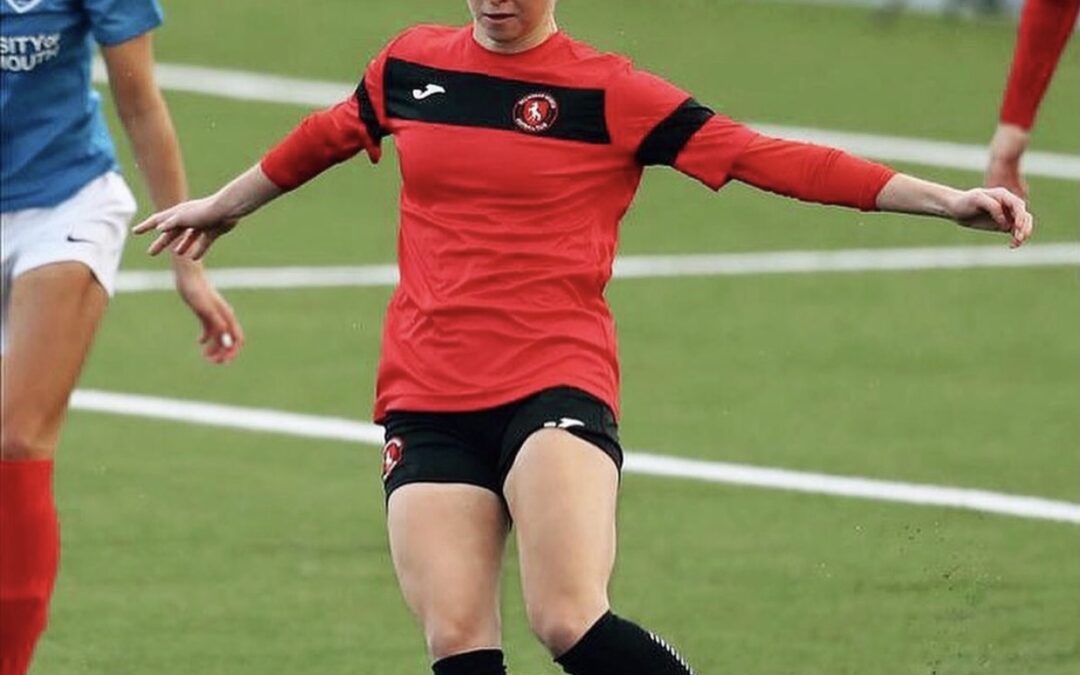Women’s football progression in the last 10 years
The Football Association Women’s Super League (FA WSL) is the highest league of women’s football in England. Established in 2010, it is run by the Football Association and currently features 12 fully professional teams. In the last 10 years, women’s football has taken a massive leap, leagues have been switched from Summer to Winter to mirror the men’s leagues and as recent as 2018-2019 a full time top-tier and semi-professional second division is in place. Who would have also imagined that Cryotherapy Recovery would be high on the rehabilitation list 10 years ago?
You can read more about progress in the game for women here in this article written for the Guardian which highlights the optimism. Despite positive changes and rising viewing figures, there is still so far to go to achieve the equality these women strive for. Here is an insight into a day in the life of ‘Defender’ Georgia Pearch a female semi-professional footballer for Gillingham Women FC, (plays L&R Wing | fullback or upfront)
In a recent interview with MTAG Football Georgia was asked
Q? What is the one change you’d like to see in the women’s game over the next 10 years?
A: The change in the women’s game already is massive and it’s great to see. In the next 10 years I’d love to see more clubs being able to have the opportunity to go full time. I would also love to see the women’s game continue to grow in popuity, increasing the fan base for women’s football, allowing teams to break even more record
Since this interview, Gillingham FC released a statement regretfully disbanding the Gillingham Ladies Senior team as a direct result of the Pandemic. Brutal and very upsetting for the girls however the good news is that the team has continued independently under a new structure managed by Josh Oatham as Gillingham Women FC
A day in the life of a semi-professional footballer
This is a fantastic and honest account of the daily routine of female footballer ‘Georgia Pearch’. It is amazing to hear about the dedication, discipline and support required in order to maintain her fitness and succeed as a semi-professional player. It is especially great to hear how Georgia takes her recovery so seriously by incorporating cryotherapy recovery into her routine.
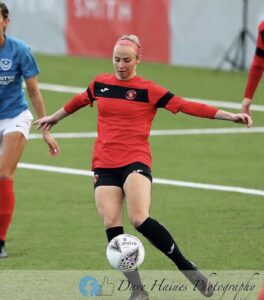
My name is Georgia Pearch and I am a fully qualified Sports Therapist. I studied Sports Therapy at the University of Kent and graduated with first-class honours in the summer of 2019. Alongside working as a Sports Therapist, I play football for Gillingham Women FC, where I am currently seeing out my first season with the club.
I have played football from a young age and have always held a big passion for the sport. I started off playing football at my local grassroots club and then got scouted to play for Brighton and Hove Albion Centre of Excellence in 2013. I stayed at Brighton for 4 seasons before I decided to make my move to Charlton Athletic Women’s FC, where I also saw out 4 seasons with the club before my move to Gillingham.
**photo courtesy of Dave Haines Photography
Training
I train with Gillingham twice a week on a Tuesday and Thursday. On a Tuesday I finish work at 6:00 pm and start training at 7:30 pm which means I have to go straight from work to football. I usually make sure I have rice and chicken for my lunch during the day and then grab myself a pasta pot to eat on the go before training. As well as eating the right foods, throughout the day I make sure I drink plenty of fluids to keep myself hydrated before the session.
| Tuesday Training
|
We arrive at 7:30 pm and go straight into the club house for a ‘team’ meeting to analyse the game from the weekend before. We then go out and have training on the pitch until 10:00 pm. By the time training has finished I usually end up leaving around 10:20 pm which means I do not get home until just after 11:00 pm. |
| Thursday Training
|
We have training from 8:00-10:00 pm which is just purely pitch based, where we work on technical and tactical development, as well as playing an 11 v 11 vs against each other in preparation for our game on Sunday. Again, by the time training finishes, I don’t get home until just after 11:00 pm. |
Adapting to the tough schedules
Being a female footballer within the third tier of women’s football, we do not get the privilege to train during the day, as most players are either in full-time education or full-time work. The late nights are a struggle at times but is something I have always had to do growing up and with time I have adapted to the late nights and early starts.
Matchday
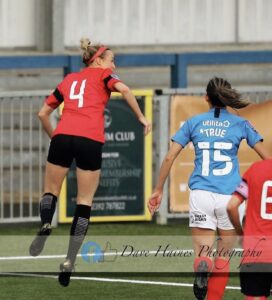 Matchday is of course my favourite day of the week, which is every Sunday for me. Our home ground is in Rochester and so takes about 50 minutes to get to from my house. Within our league we have teams such as Cardiff, Plymouth and Portsmouth, meaning some weekends we may have to stay away or travel up very early on a Sunday morning.
Matchday is of course my favourite day of the week, which is every Sunday for me. Our home ground is in Rochester and so takes about 50 minutes to get to from my house. Within our league we have teams such as Cardiff, Plymouth and Portsmouth, meaning some weekends we may have to stay away or travel up very early on a Sunday morning.
No matter what the circumstances, I will always have a bagel for breakfast and then a cheese sandwich (with wholegrain bread) for lunch, as kick-off is not normally until 2:30 / 3:00 pm.
Ever since I first started playing football my Mum and Dad would come to watch me play every game, home and away, and they continue to do so… Although I do occasionally give them the weekend off, especially when it is a long journey. Having my Mum and Dad take me to my football matches means I can fully concentrate on the game ahead and listen to my game day playlist (essential!), allowing me to ‘get in the zone’. I am the nervous type when it comes to football and get rather nervous before every game, so for me to be able to completely switch off and concentrate just on football, instead of driving, is important for me.
Nutrition and diet
It is essential that the night before game-day I eat a meal that is carbohydrate-based for dinner and drink PLENTY of water, along with getting a good night sleep. So yes… that means I am very rarely seen out in town on a Saturday night! To some people that may sound like their worst nightmare, giving up their weekend to football after a hard weeks work, but to me it’s just something I’ve always committed to and without it, my weekend wouldn’t be the same.
After the match, 9 times out of 10 I feel like I have been hit by a bus and am exhausted and in great need of a nice warm bath and my bed. Before we are to head home, we are provided with some food and snacks which allows us to have a chat together as a squad, whilst refuelling before we go home for our roast dinners that evening. P.S. you can never have too much food after game day!!!
Preparation and recovery from training and matches
So, I would like to introduce you to my best friend which helps me to prep and recover from training and match days… CRYOTHERAPY!
Cryotherapy recovery
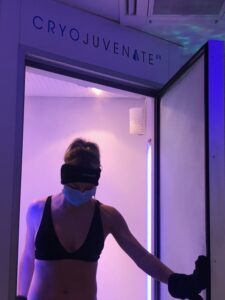 I first came across cryotherapy recovery growing up when I sprained my ankle and cryotherapy was used to help with the recovery process and rehabilitation post-trauma. Cryotherapy recovery, at the time, wasn’t part of my routine, it was something I associated injuries around as this was my only experience with cryotherapy. My knowledge around cryotherapy was evidentially scarce and little did I know it had SO MANY more benefits than just helping the recovery process of an injury.
I first came across cryotherapy recovery growing up when I sprained my ankle and cryotherapy was used to help with the recovery process and rehabilitation post-trauma. Cryotherapy recovery, at the time, wasn’t part of my routine, it was something I associated injuries around as this was my only experience with cryotherapy. My knowledge around cryotherapy was evidentially scarce and little did I know it had SO MANY more benefits than just helping the recovery process of an injury.
I had begun to see and hear about cryotherapy recovery being used a lot more widely in sport, especially whole body cryotherapy chambers, which then sparked an interest for me to find out more about the true benefits of cryotherapy and this is when I stumbled across Cryojuvenate in Sevenoaks. By looking at the Cryojuvenate website I soon found out that cryotherapy wasn’t just used for injuries and in fact was used for a variety of reasons to help with things such as muscle soreness, recovery, sleep, mood, blood flow, metabolic rate… the list goes on.
I started to incorporate cryotherapy recovery within my weekly routine in 2019, where I would use the cryotherapy chamber at Cryojuvenate twice a week. The cryotherapy chamber is electronically set to -85 degrees, yes that is right -85℃ degrees. I started off by going into the chamber for 3 minutes, but the more I used the chamber and the more I got used to it, I gradually increased the duration to 4 minutes.
Colder than an ICE BATH, temperatures down to -85℃ degrees
Although the chamber is incredibly cold, it is a dry cold and therefore it is not painful like if you were to jump into freezing water. The first time I used the chamber I was very apprehensive, but it surprised me with how my body adapted to being in an extremely cold environment. After the chamber, which is my favourite part, I feel really energised and awake, like I have had an adrenalin rush and this lasts for some time after.
Before using the cryo chamber on a regular basis, after a typical week of football training and game day, I would feel incredibly achy, tight and lethargic by the end of the week. Since using the cryo chamber I have found a big improvement in my recovery process, sleeping pattern and overall mood. I feel like I am able to recover much quicker after a typical football week and have sustained less injuries since incorporating cryo into my weekly routine.
I have always suffered from injuries and so to find something that helps my body to recover and reduce injuries is essential for both my physical health and footballing career.
Localised targeted cryotherapy
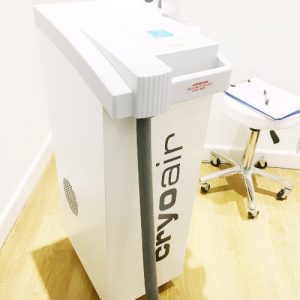 At Cryojuvenate they also have a machine called “Localised Cryotherapy” which goes as low as -42 degrees and is used to target specific points of the body that may be injured or areas that are feeling particularly sore and achy. The Local Cryotherapy machine is great as it is a quick 10-minute treatment that I use if I get any niggles or injuries. The cold flow and very low temperatures help to reduce inflammation, swelling and pain and in turn increases range of motion at the specific area, helping me to recover quicker after an injury or a slight knock that I may have picked up during training or matches.
At Cryojuvenate they also have a machine called “Localised Cryotherapy” which goes as low as -42 degrees and is used to target specific points of the body that may be injured or areas that are feeling particularly sore and achy. The Local Cryotherapy machine is great as it is a quick 10-minute treatment that I use if I get any niggles or injuries. The cold flow and very low temperatures help to reduce inflammation, swelling and pain and in turn increases range of motion at the specific area, helping me to recover quicker after an injury or a slight knock that I may have picked up during training or matches.
So far, I have loved my experience with Cryotherapy and the cryotherapy recovery and will continue to use it!
Aspirations
In the future, I hope to progress into the Women’s Championship and play consistent first-team football at that level. The Championship is the league above the National League (which is the league I am currently playing in) and is one league off of the Women’s Super League, which is the highest league in England for women’s football. For me playing for a first-team within the Championship would be a great achievement and is currently my main goal.


